| Srl | Item |
| 1 |
ID:
085932
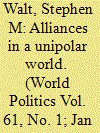

|
|
|
|
|
| Publication |
2009.
|
| Summary/Abstract |
An alliance (or alignment) is a formal (or informal) commitment for security cooperation between two or more states, intended to augment each member's power, security, and/or influence.
|
|
|
|
|
|
|
|
|
|
|
|
|
|
|
|
| 2 |
ID:
166155
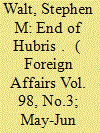

|
|
|
| 3 |
ID:
110685
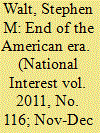

|
|
|
|
|
| Publication |
2011.
|
| Summary/Abstract |
THE UNITED States has been the dominant world power since 1945, and U.S. leaders have long sought to preserve that privileged position. They understood, as did most Americans, that primacy brought important benefits. It made other states less likely to threaten America or its vital interests directly. By dampening great-power competition and giving Washington the capacity to shape regional balances of power, primacy contributed to a more tranquil international environment. That tranquility fostered global prosperity; investors and traders operate with greater confidence when there is less danger of war. Primacy also gave the United States the ability to work for positive ends: promoting human rights and slowing the spread of weapons of mass destruction. It may be lonely at the top, but Americans have found the view compelling.
|
|
|
|
|
|
|
|
|
|
|
|
|
|
|
|
| 4 |
ID:
121517


|
|
|
| 5 |
ID:
087611


|
|
|
|
|
| Publication |
2009.
|
| Summary/Abstract |
In The Israel Lobby and U.S. Foreign Policy, we argued that the "special relationship" between the United States and Israel is due largely to the influence of a domestic interest group-comprised of Jews as well as non-Jews-and that this unusual situation is harmful to both the United States and Israel. Jerome Slater's thoughtful review endorses many of our central arguments, but it also highlights several points of disagreement. He argues that we overlooked important alternative sources, defined the lobby too broadly, and exaggerated its influence on Congress and especially the Executive Branch. Although Slater is even more critical of U.S. Middle East policy than we are, he argues that the special relationship is due to strong cultural and religious affinities and broad public support in American society, and not to the influence of the lobby. In fact, the alternative sources cited by Slater do not undermine our basic claims; a broad conception of the lobby makes more sense than his narrower definition; and there is little disagreement between us about the lobby's influence on Capitol Hill or in the White House. Most importantly, public opinion in the United States does not explain why the United States gives Israel such extensive and nearly unconditional backing. Although most Americans have a favorable image of Israel, surveys show that they also favor a more even-handed Middle East policy and a more normal relationship with Israel. Thus, the special relationship is due primarily to the lobby's influence, and not to the American people's enduring identification with the Jewish state.
|
|
|
|
|
|
|
|
|
|
|
|
|
|
|
|
| 6 |
ID:
141549
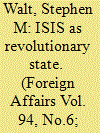

|
|
|
|
|
| Summary/Abstract |
ISIS, seems uniquely baffling and unusually dangerous . According to its leaders’ own statements, the group wants to eliminate infidels, impose sharia worldwide, and hasten the arrival of the Mahdi. ISIS' foot soldiers have pursued these goals with astonishing cruelty. Yet unlike the original al Qaeda, which showed little interest in controlling territory, ISIS has also sought to build the rudiments of a genuine state in the territory it controls. It has established clear lines of authority, tax and educational systems, and a sophisticated propaganda operation. It may call itself a “caliphate” and reject the current state-based international system, but a territorial state is what its leaders are running. As Jürgen Todenhöfer, a German journalist who visited territory in Iraq and Syria controlled by ISIS, said in 2014, “We have to understand that ISIS is a country now .”
|
|
|
|
|
|
|
|
|
|
|
|
|
|
|
|
| 7 |
ID:
157569


|
|
|
| 8 |
ID:
073970
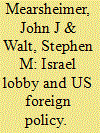

|
|
|
| 9 |
ID:
109528
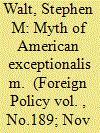

|
|
|
| 10 |
ID:
154806
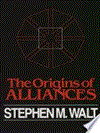

|
|
|
|
|
| Edition |
Paperback ed.
|
| Publication |
Ithaca, Cornell University Press, 1987.
|
| Description |
xii, 321p.pbk
|
| Series |
Cornell Studies in Security Affairs
|
| Standard Number |
9780801494185
|
|
|
|
|
|
|
|
|
|
|
|
Copies: C:1/I:0,R:0,Q:0
Circulation
| Accession# | Call# | Current Location | Status | Policy | Location |
| 059168 | 327.1160956/WAL 059168 | Main | On Shelf | General | |
|
|
|
|
| 11 |
ID:
065405


|
|
|
|
|
| Publication |
Sep-Oct 2005.
|
| Summary/Abstract |
U.S. policymakers debate how to wield American power; foreigners debate how to deal with it. Some make their peace with Washington and try to manipulate it; others try to oppose and undercut U.S. interests. The challenge for the United States is how to turn its material dominance into legitimate authority.
|
|
|
|
|
|
|
|
|
|
|
|
|
|
|
|
| 12 |
ID:
066806


|
|
|
|
|
| Publication |
New York, W W Norton, 2005.
|
| Description |
320p.
|
| Standard Number |
0393052036
|
|
|
|
|
|
|
|
|
|
|
|
Copies: C:1/I:0,R:0,Q:0
Circulation
| Accession# | Call# | Current Location | Status | Policy | Location |
| 050418 | 327.73/WAL 050418 | Main | On Shelf | General | |
|
|
|
|
| 13 |
ID:
157783
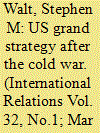

|
|
|
|
|
| Summary/Abstract |
This article uses realism to explain past US grand strategy and prescribe what it should be today. Throughout its history, the United States has generally acted as realism depicts. The end of the Cold War reduced the structural constraints that states normally face in anarchy, and a bipartisan coalition of foreign policy elites attempted to use this favorable position to expand the US-led ‘liberal world order’. Their efforts mostly failed, however, and the United States should now return to a more realistic strategy – offshore balancing – that served it well in the past. Washington should rely on local allies to uphold the balance of power in Europe and the Middle East and focus on leading a balancing coalition in Asia. Unfortunately, President Donald Trump lacks the knowledge, competence, and character to pursue this sensible course, and his cavalier approach to foreign policy is likely to damage America’s international position significantly.
|
|
|
|
|
|
|
|
|
|
|
|
|
|
|
|
| 14 |
ID:
071269
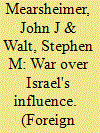

|
|
|
| 15 |
ID:
100522
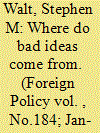

|
|
|